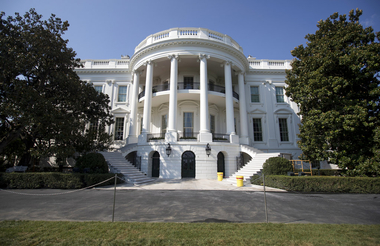Trump administration response to transgender protections

It doesn’t take the Trump administration long to show its true colors regarding LGBT+ issues. After Senators Susan Collins (R-ME) and Kirsten Gillibrand (D-NY) proposed an amendment to the National Defense Authorization Act to protect transgender military service members, it wasn’t expected to take long before the administration expressed its opposition to the amendment.
It didn’t.
“A White House National Security Council spokesperson told the Washington Blade the administration opposes the amendment, which may be considered on the U.S. Senate floor this week as part of the fiscal year 2018 defense authorization bill,” according to the Blade.
(See earlier coverage by The Gayly of the amendment at Two senators support transgender military service.)
“’The administration opposes the Sen. Gillibrand amendment,’ the NSC spokesperson said. ‘The president signed an EO tasking DOD with implementation.’”
Clear enough, although it wasn’t an executive order, it was a memorandum for the Secretary of Defense and the Secretary of Homeland Security (DHS).
The August 25 document recounts the Obama administration’s removal of a ban on transgender military members, noting that until June 2016 the DOD and the DHS had that ban in effect.
The President wrote, “In my judgment, the previous Administration failed to identify a sufficient basis to conclude that terminating the Departments' longstanding policy and practice would not hinder military effectiveness and lethality, disrupt unit cohesion, or tax military resources, and there remain meaningful concerns that further study is needed to ensure that continued implementation of last year's policy change would not have those negative effects.”
He continued, “By the authority vested in me as President and as Commander in Chief of the Armed Forces of the United States under the Constitution and the laws of the United States of America, including Article II of the Constitution, I am directing the Secretary of Defense, and the Secretary of Homeland Security with respect to the U.S. Coast Guard, to return to the longstanding policy and practice on military service by transgender individuals that was in place prior to June 2016 until such time as a sufficient basis exists upon which to conclude that terminating that policy and practice would not have the negative effects discussed above.”
Although that sounds promising, it probably isn’t. The memorandum says the services shall, “maintain the currently effective policy regarding accession of transgender individuals into military service beyond January 1, 2018, until such time as the Secretary of Defense, after consulting with the Secretary of Homeland Security, provides a recommendation to the contrary that I find convincing. [Emphasis added.]
It's anybody's guess what the President would find convincing. There is plenty of evidence that there is no effect on the services from the current service of as many as 15,000 transgender service members. As to the cost - the "tax military resources" part of the President's memorandum - conservatives have quoted inflated but unsubstantiated costs as being in the billions. In fact, a Rand Corp. study in 2016 pegged the cost at $2.4 to $8.4 million, which amounts to an increase of 0.04 percent to 0.13 percent in health care spending for active-duty members.
The amendment proposed by Senators Collins and Gillibrand would reverse parts of the President’s order to the DOD and DHS.
Its provisions would:
- Express a sense of Congress that individuals who are qualified and can meet the standards to serve in the military should be eligible to serve;
- Prohibit DOD from involuntarily separating, or denying the reenlistment or continuation in service in the Armed Forces of, currently serving transgender service members solely on the basis of the member’s gender identity; and
- Require Secretary Mattis to complete his review of accession of transgender individuals into the Armed Forces by the end of this year and report the results to Congress.
Whether the amendment will see a vote or not is unknown at this time. It is expected that it would need the vote of 60 senators to pass. The amendment does not address the issue of providing appropriate transition care for members who are transitioning.
In addition to efforts in Congress, there are lawsuits asking a federal judge in Washington to bar the President from banning transgender military service. (See Transgender military ban under siege in courts.)
Copyright The Gayly – September 13, 2017 @ 1:40 p.m. CDT.





